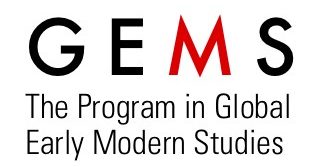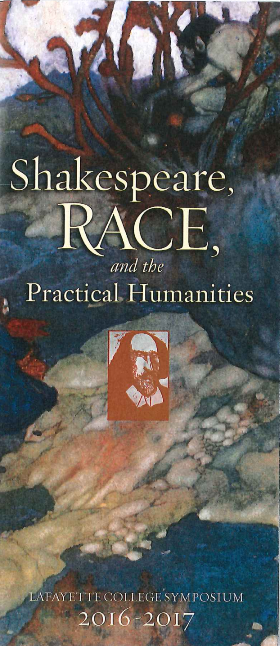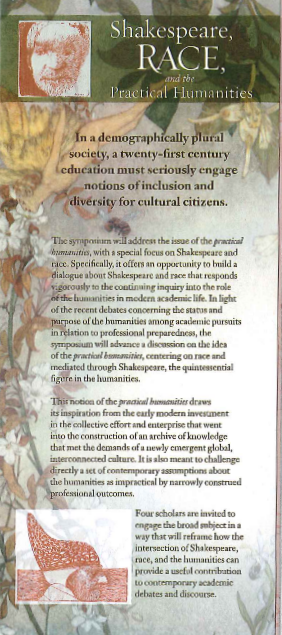Nov 10, April 19-20 | Shakespeare, Race, and the Practical Humanities | Lafayette College Symposium 2016-2017
In a demographically plural society, a twenty-first century education must seriously engage notions of inclusion and diversity for cultural citizens.
The symposium will address the issue of the practical humanities, with a special focus on Shakespeare and race. Specifically, it offers an opportunity to build a dialogue about Shakespeare and race that responds vigorously to the continuing inquiry into the role of the humanities in modern academic life. In light of the recent debates concerning the status and purpose of the humanities among academic pursuits in relation to professional preparedness, the symposium will advance a discussion on the idea of the practical humanities, centering on race and mediated through Shakespeare, the quintessential figure in the humanities.
This notion of the practical humanities draws its inspiration from the early modern investment in the collective effort and enterprise that went into the construction of an archive of knowledge that met the demands of a newly emergent global, interconnected culture. It is also meant to challenge directly a set of contemporary assumptions about the humanities as impractical by narrowly construed professional outcomes.
Four scholars are invited to engage the broad subject in a way that will reframe how the intersection of Shakespeare, race, and the humanities can provide a useful contribution to contemporary academic debates and discourse.
November 10th, 4:30 PM
 Ian Smith: “Shakespeare’s Othello: The World, the Text, and the Responsible Reader”
Ian Smith: “Shakespeare’s Othello: The World, the Text, and the Responsible Reader”
An intense public debate over the deaths of unarmed black persons has emerged to challenge the thesis of a postracial, colorblind America and to force an inquiry into the postracial myth’s own premise as complicit with the politics of white privilege. In the wake of severely split public reactions to these deaths, Othello is strategically situated to initiate a powerful dialogue about Shakespeare and race that sustains the vital connections among the world, the text, and the responsible reader.
Additional details regarding this session are available on Lafayette University’s website.
April 19, 7:00 PM
 Michael Witmore: “Is It Practical to Talk About Shakespeare and Race?”
Michael Witmore: “Is It Practical to Talk About Shakespeare and Race?”
Michael Witmore, a scholar of Shakespeare and early modern literature and pioneer in the digital analysis of Shakespeare’s texts, is a Director of the Folger Shakespeare Library. Prior to that, he was a Professor of English at the University of Wisconsin where he directed the Working Group for Digital Inquiry, a group of humanists who use computers to assist in traditional humanities research. His books include Shakespeare and Early Modern Religion, co-edited with David Loewenstein (2014); Landscapes of the Passing Strange: Reflections from Shakespeare (2010), a collaboration with writer/photographer Rosamond Purcell; Shakespearean Metaphysics (2008); Pretty Creatures: Children and Fiction in the English Renaissance (2007); Culture of Accidents: Unexpected Knowledges in Early Modern England (2001); and Childhood and Children’s Books in Early Modern Europe, 1550‑1800 (2006), which he co-edited. He is currently writing a book on the digital analysis of Shakespeare’s leads with Jonathan Hope and shares work in progress on his blog winedarksea.org. Witmore earned an A.B. in English at Vassa College and an M.A. and PhD in rhetoric at the University of California, Berkeley.
April 20, 7:00 PM, Colton Chapel
 Peter Erickson: “Seeking the Practical in the Contemporary”
Peter Erickson: “Seeking the Practical in the Contemporary”
Peter Erickson, visiting resident scholar at Northwestern University’s Kaplan Institute for the Humanities, is author of Patriarchal Structures in Shakespeare’s Drama(1985); Rewriting Shakespeare, Rewriting Ourselves (1991); and Citing Shakespeare: The Reinterpretation of Race in Contemporary Literature and Art (2007) and co-editor of three volumes: Shakespeare’s “Rough Magic” (1985); Early Modern Visual Culture: Representation, Race, and Empire in Renaissance England (2000); and Approaches in Reading Shakespeare’s Othello (2005). Erickson has also written extensively on the work of African American artist Fred Wilson in his decade-long engagement with Shakespeare. Most recently Erickson has co-edited, with Kim Hall, a special issue (Spring 2016) of Shakespeare Quaterly focusing on early modern race studies.
 Ayanna Thompson: “Confessions of a Black Shakespearean: or, a Talk about Productive Grappling”
Ayanna Thompson: “Confessions of a Black Shakespearean: or, a Talk about Productive Grappling”
Ayanna Thompson is a Professor of English at George Washington University, and she specializes in Renaissance drama and issues of race in/as performance. She is the author of Teaching Shakespeare with Purpose: A Student-Centred Approach (2016), Passing Strange: Shakespeare, Race, and Contemporary America (2011), and Performing Race and Torture on the Early Modern Stage (2008). She wrote the new introduction for the revised Arden3 Othello and is the editor of Weyward Macbeth: Intersections of Race and Performance (2016). Professor Thompson has served as a Trustee of the Shakespeare Association of America and a member of the Board of Directors for the Association of Marshall Scholars.
 Kim Hall: Respondent
Kim Hall: Respondent
Kim Hall is the Lucyle Hook Chair of English and a Professor of Africana Studies at Barnard College where she teaches courses in Early Modern / Renaissance Literature, Black Feminist Studies, Critical Race Theory and Food Studies. She is the author of Things of Darkness: Economies of Race and Gender in Early Modern England and Othello: Texts and Contexts. Professor Hall was the Barnard Library’s inaugural “Faculty Partner of the Year” (2014) and 2015 winner of the College’s Tow Award for Innovative Pedagogy. This year Diverse Issues in Higher Education named her one of “25 Women Making a Difference in Higher Education and Beyond.” She is currently working on The Sweet Taste of Empire, which examines the interplay of gender, race, and material culture in the seventeenth century Anglo-Caribbean sugar trade, and ‘Othello Was My Grandfather’: Shakespeare and the African Diaspora for which she has received grants from the NEH, the National Humanities Center, and the Schomburg Center for Research in African American Culture.





